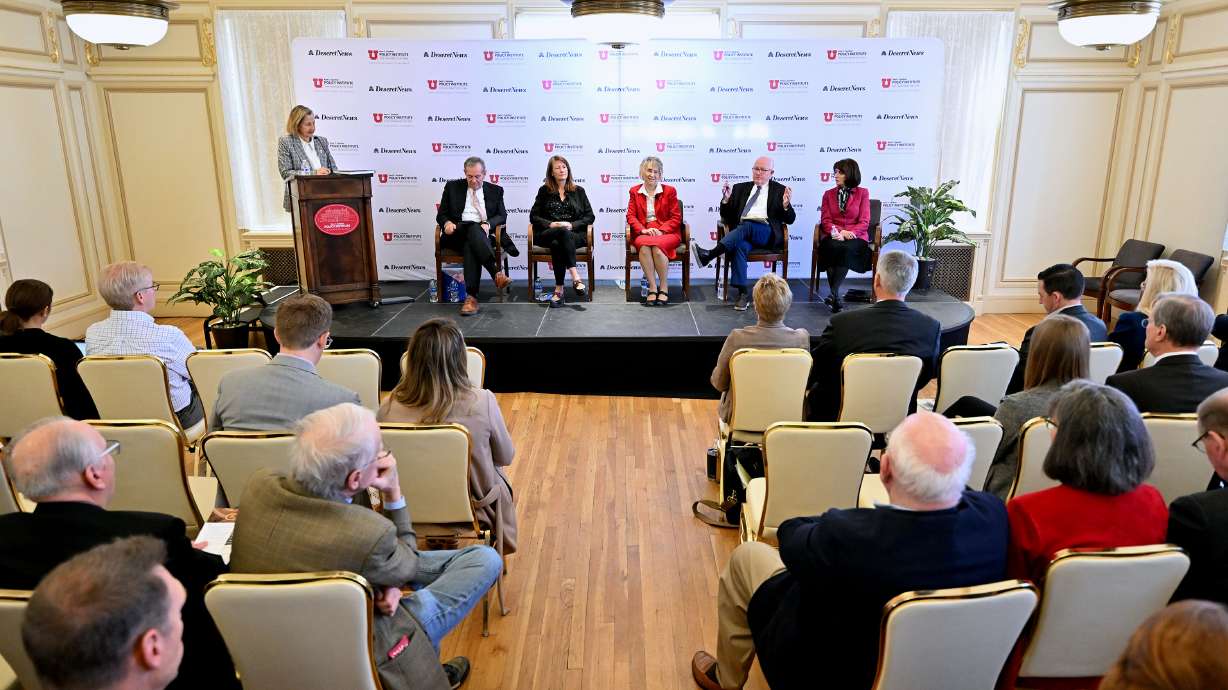Estimated read time: 4-5 minutes
This archived news story is available only for your personal, non-commercial use. Information in the story may be outdated or superseded by additional information. Reading or replaying the story in its archived form does not constitute a republication of the story.
SALT LAKE CITY — It's no surprise that education is intimately tied with Utah's economy, society, and in turn its future, as the state is rapidly growing and needs an educated workforce.
But where should the state be directing its policies and investments in order to optimize educational outcomes for students while also supporting teachers?
That was the crux of a discussion Monday during a summit hosted by the Kem C. Gardner Policy Institute in partnership with the Deseret News and the Hinckley Institute of Politics. Educational and political leaders alike weighed in on how Utah's past can inform the future when it comes to the most pressing issues facing the state.
Challenges in education
When she's not on Capitol Hill, Sen. Kathleen Riebe, D-Cottonwood Heights, can be found in the classroom, where she's a teacher in the Granite School District. Riebe said that one of the biggest challenges she sees facing education is recruiting and retaining high-quality educators.
"Right now, when you think about education, you have to think about a 35-year career and just thinking about how we can off-ramp and on-ramp teachers in a more fluid way," Riebe said.
While Utah ranks favorably when it comes to teacher shortages, retention and salary outcomes compared to other states, there are still avenues for improvement.
According to report from the Gardner Institute, pay is one important component of attracting and keeping teachers. While Utah carries the second highest average starting teacher salary among states, its average salary of $58,619 ranks 26th after adjusting for cost of living for the 2021-22 school year. Furthermore, Utah's adjusted average salary falls below the national average ($61,047) by a few thousand dollars.
The 2023 legislative session saw the passing of HB215, which provided licensed educators with a $4,200 pay raise with an additional $1,800 in benefits.
"The secret sauce (of education) is teachers. And the fact is teachers are not being treated well these days, and Utah has to focus on retaining the best and brightest teachers," said Rich Kendell, former deputy to Gov. Michael O. Leavitt for public education and higher education, and former commissioner of the Utah System of Higher Education.
Data backs up what Kendell said, too. A Utah State Board of Education study that asked educators leaving the profession after the 2020-2021 school year why they're doing so found the top two reasons for leaving were emotional exhaustion or burnout and job-specific stressors, with salary coming in third.
More specifically, the two specific stressors identified most frequently by exiting teachers were unrealistic workload expectations (35.8%) and a lack of recognition, respect or general accountability (20.4%).
Modernizing education
Sydnee Dickson, Utah state superintendent of public instruction, said she's often asked about Utah's education system "because we are seen as a state who is modernizing or attempting to modernize education."
But what does a modernized education look like?
It doesn't mean Utah is going to forsake the common pillars of education like math, reading, writing, science, social studies and whatever else you can think of from your K-12 experience, but that other focus areas are emerging to help better prepare students for the future.
Dickson said the state is in a space "where we have got to double down on what I call the durable skills," adding that these skills consist of collaboration, critical thinking and problem solving — all things that go beyond a traditional school curriculum.
Modernizing education also means moving away from some systems that have been in place for a long time. One example of this, Dickson said, is embarking on competency-based education.
According to Educause, a nonprofit focused on advancing education through the use of information technology, competency-based education is an approach that allows students to advance based on their ability to master a skill or competency at their own pace, regardless of environment. A common argument for this model is that it caters to the unique learning abilities of students and can lead to more efficient outcomes.
Essentially, it's a more tailored form of education.
"We have to really invest in and think about, long term, how do we create a modernized education system that's more personalized, more competency-based, more focused on those durable skills and teaching us how to be good human beings?" Dickson said.
At the end of the day, Dickson said it comes down to creating a system that ensures students are ready for life after high school, whether that be in the workforce or higher education.
Correction: A previous version incorrectly said HB215 was passed during the 2024 legislative session instead of the 2023 legislative session.










